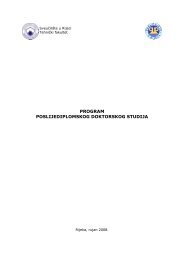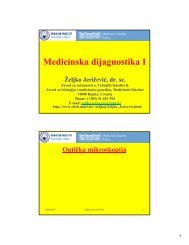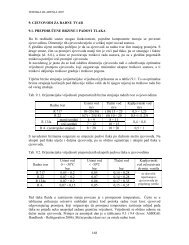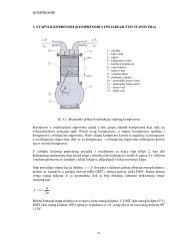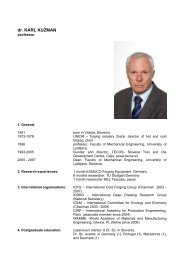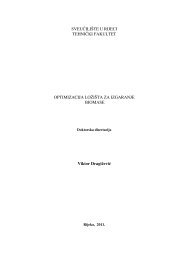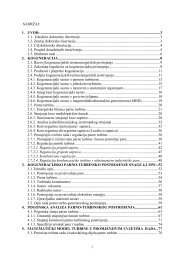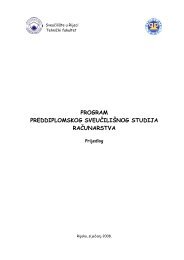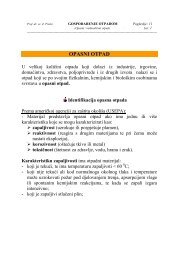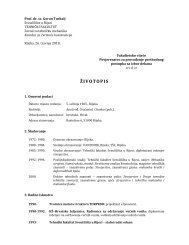universityâenterprise cooperation
universityâenterprise cooperation
universityâenterprise cooperation
Create successful ePaper yourself
Turn your PDF publications into a flip-book with our unique Google optimized e-Paper software.
ships between universities, enterprises<br />
and graduates, leading to mutual benefits.<br />
Enterprise, SME or Company benefit from<br />
a highly qualified graduates (or employed<br />
engineers), as industrial fellows, who spend<br />
minimum 6 months to 2 years at University<br />
research and or excellence centres, for professional<br />
development, participating in specific research<br />
projects targeted to industry needs and company<br />
business. They work as part of enterprise,<br />
supported by a team of university experts<br />
– professors, teachers, researchers, who<br />
bring out technical expertise, research, and<br />
innovation to the enterprise or the company.<br />
Industrial fellows serve as ”gatekeeper”<br />
for knowledge and technology transfer from<br />
university to their enterprises and provide<br />
excellent communication channels between<br />
them.<br />
It is planned to develop IFP programme<br />
within WBC-VMnet TEMPUS project, during<br />
the second year of implementation, which<br />
will define:<br />
• Procedures for administration and<br />
management of the programme;<br />
• Conditions for qualifying of enterprise or<br />
the company;<br />
• Funding rules;<br />
• Requirements for graduates;<br />
• Obligations of university research centre<br />
and mentor, who will be responsible for<br />
the career development of graduates;<br />
• Related services for enterprise;<br />
• Intellectual property rights (IPR);<br />
• Quality monitoring rules etc.<br />
IFP programme manual and promotional leaflets will<br />
be published and distributed to public at large.<br />
6.3.8 Other <strong>cooperation</strong> modalities<br />
Finally, it is very important to emphasis the role<br />
of students in further development of universityenterprises<br />
<strong>cooperation</strong>. As an illustration,<br />
the students of University of Novi Sad, Serbia<br />
established a consulting company “CORE” with<br />
the aim of providing services to SMEs, and the<br />
Rectorate has also used their services. Within<br />
the “CORE”, close contacts with the Techno<br />
Park Sankt Augustin were developed, and an<br />
agreement between Timisoara incubators, the<br />
Szeged initiative and the University of Novi Sad<br />
Incubation Centre was reached to start a joint<br />
business idea competition.<br />
Furthermore, we would like to suggest also that the<br />
Competition for the Best Technology Innovation<br />
(now organized jointly with the Serbian Ministry<br />
of Science and Technological Development, and<br />
the Chamber of Commerce of Serbia) would obtain<br />
regional importance covering all WB region. This<br />
Contest will have the following aims:<br />
• To promote and foster entrepreneurial culture in<br />
High-Tech area, as well as to boost competitive<br />
potential of WBC region;<br />
• To organize trainings for all participants<br />
in all aspects of business plan writing,<br />
as well as trainings in negotiation and<br />
presentation and communication skills.<br />
The some categories can be: realized<br />
innovations, energy efficiency, innovative<br />
ideas, potentials and innovative<br />
municipalities. The special rewards can be<br />
given for the best student team and best female<br />
team. The Contest’s Final should be presented at<br />
national and regional broadcast services.<br />
6.3.9 Recommendations<br />
From previously suggested and described<br />
mechanisms and possible structures of<br />
new WBC model of university- enterprise<br />
<strong>cooperation</strong>, we would like to summarize the<br />
following recommendations:<br />
Recommendation 1<br />
Governments of the WBCs should accelerate<br />
a transition of researchers from academic<br />
sphere to enterprises through a greater<br />
emphasis on the mobility aspects of the best<br />
young researchers.<br />
Recommendation 2<br />
Governments of the WBCs should also<br />
introduce tax incentives for projects which<br />
involve knowledge transfer from universities<br />
to enterprises in order to encourage<br />
innovation in SMEs.<br />
115<br />
New WBC model of university-enterprise <strong>cooperation</strong> 6



